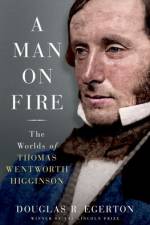- The Worlds of Thomas Wentworth Higginson
av Douglas Egerton
449,-
Few Americans covered as much ground as Thomas Wentworth Higginson. Born in 1823 to a family descended from Boston's Puritan founders, he attended Harvard, like all the men in his family, and prepared for the settled life of a minister. Instead, he rejected both privilege and convention, and embraced radical causes, attaching himself to nearly every major reform movement of the day, from women's rights to abolitionism. More than merely a fellow traveler, Higginson became a proponent of direct action. Wounded during an altercation with the police over an enslaved man who -in defiance of the Fugitive Slave Act-was fighting extradition to the South, Higginson wore the scar with pride. He became a member of Boston's Secret Six, supporting John Brown's raid and going to Bleeding Kansas with his rifle, prepared to put his life on the line. During the Civil War Higginson went to South Carolina and led one of the first Black regiments, the 1st Carolina Volunteers, into battle. Man of action though he was, "Colonel" Higginson was also a writer and journalist, friend of Ralph Waldo Emerson and Henry David Thoreau, and one of the founding editors of the Atlantic Magazine. Emily Dickinson sought out his advice and their correspondence attests both to Dickinson's genius and Higginson's attempt to help it reach a larger audience. Until his death in 1911, Higginson played a role, often a leading and vocal part, in nearly every progressive movement of the 19th century, earning a place in studies of abolitionism, feminism, education, temperance, Victorian fiction, as well as films, novels, and books featuring Dickinson and Harriet Tubman (whom he met in South Carolina during the Civil War). These reveal only aspects of Higginson's storied life. Douglas Egerton's biography embraces all the facets of this American whirlwind, illuminating the ways in which Higginson's lifelong crusade for a more just world resonates today.

